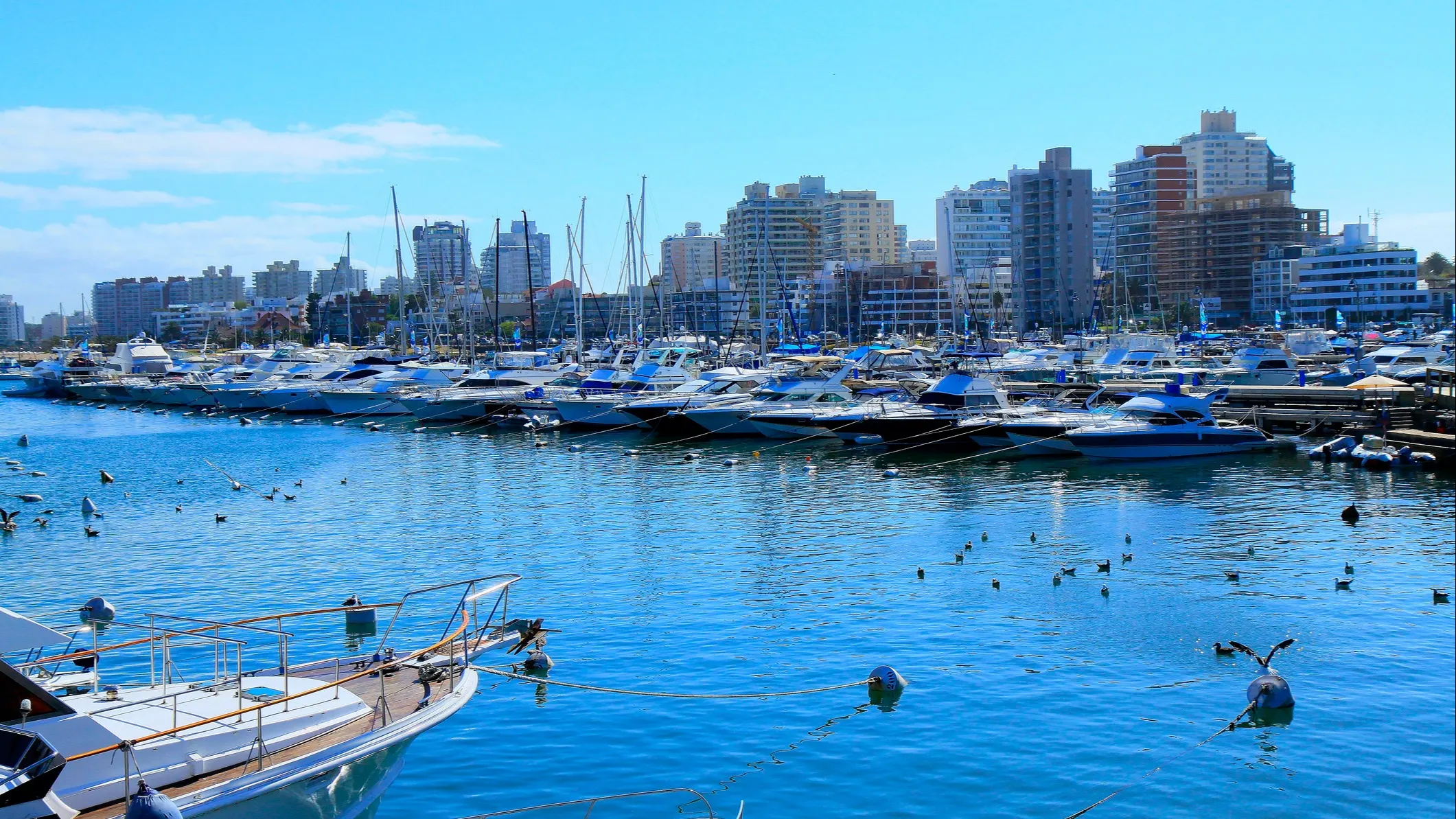Uruguay Visa and Residency Information: How to Become a Resident
13 min readBy David Hammond
Uruguay is an oft-forgotten gem in South America, dwarfed by neighboring Brazil. It offers that gorgeous, sub-tropical climate, which means it generally stays warm or cool, without venturing into either extreme.
It’s also known for being one of the more stable political and economic states in South America, with a socially progressive attitude toward daily life.
Maybe you’d like to visit Uruguay. Or, you’ve already explored it, liked what you found, and are ready to make a move.
That’s how it was for me. After a visit, I returned to live and became a legal resident. Since then, I’ve met many who’ve done the same, with many going on to become Uruguayan citizens.
What does it take to enter Uruguay as a traveler, legal resident, or citizen?
If you’re from any of the U.S., Canada, the UK, EU member states, and most Latin American countries, you don’t need a visa to enter Uruguay to travel. If you arrive in Uruguay from a country that doesn’t require a visa, you’re automatically considered a tourist. And you can stay for up to 90 days.
If you want to stay longer, you can often get a 90-day extension for a total of 180 days. (You need to request the extension before your first 90 days expire.)
If you’re a citizen of China (with the exception of Hong Kong and Macau), India, Pakistan, and many Middle Eastern and African nations, you must attain a visa before coming to Uruguay.
To see a full list of countries and their visa requirements, click here.
To acquire a visa, you must go through the Uruguayan consulate with jurisdiction over your area. Types of available visas include:
- Tourist Visa
- Business Visa
- Work Visa
- Study Visa
- Family Reunification Visa
- Humanitarian and Emergency Visa
- And Visas for International Congresses, Conventions, and Seminars
The two main categories of residency are:
Permanent residency, to live permanently in Uruguay
Temporary residency, to stay in Uruguay for a limited time for a specific purpose
For both permanent and temporary residency, there are two paths.
- One path is for people from Mercosur* member countries, and/or for people with Uruguayan relatives.
- The other is for people not from Mercosur countries and without any family ties in Uruguay.
(*Mercosur is a regional trade block. It includes four-member countries (Uruguay, Brazil, Argentina, and Paraguay) and several associate member countries, all in South America.)
The following requirements, processes, and documents described in this article are for those of us not from a Mercosur country and without family ties in Uruguay.
Benefits
As a permanent resident, you can
- Live in Uruguay full-time.
- Get a job or start a business.
- Opt to import your home furnishings and household goods to Uruguay duty-free.
- Sign up to use the state health care system, Administración de los Servicios de Salud del Estado (ASSE). (While most expats get on a private plan, the state plan is an inexpensive option that’s always available.)
- And if you want to become a citizen of Uruguay, residency is a step in the process.
The Process
The government office that oversees tourist entry and residency matters in Uruguay is the Dirección Nacional de Migración (National Directorate of Migrations). In this article, we’ll refer to it as the Immigration Office.
The Immigration Office headquarters is in Montevideo, Uruguay’s capital. You also find satellite offices serving other regions of the country.
To become a resident, you first enter Uruguay as a tourist. Once in Uruguay, you request a residency interview at an Immigration Office.
At the interview, you confirm you want to live in Uruguay and provide the required documentation. If you’re not a Spanish speaker, you’ll need to bring an interpreter with you.
Once you provide all the required documentation, you become a Residente en trámite (a resident in the process.)
As a resident in process, you get a temporary Uruguayan I.D. card. You also get most of a legal resident’s rights and privileges while waiting for the final approval.
Once your residency is fully approved, you get a Uruguayan I.D. card, proving that you’re a legal resident of Uruguay.
As a permanent resident, you renew your Uruguayan I.D. card every three years, which is a much simpler process.
Documentation Needed
- A Passport Photo
- Legal Identification
This must be the same I.D. you used to enter the country.
- A Criminal Background Check Certificate
You need to provide a police report (national in scope) from your country of origin. You also need to provide a report from countries where you’ve lived for more than six months in the last five years. Applicants from the U.S. need an FBI background check in place of a police report.
Note: If you’ve had a brush with the law, discuss the matter with an experienced immigration attorney in Uruguay. They may be able to present a case as to why the occurrence should not keep you from becoming a legal resident.
- A Current Uruguayan Health Card
The health card requires a medical exam at a clinic authorized by Uruguay’s Ministry of Health. (The exam is to assess your health, and it’s not a screening test.)
- A Uruguayan Vaccine Certificate
A Uruguayan vaccinator issues the certificate. It shows you’re up to date with the country’s vaccine schedule.
- Notarial Income Certificate
This proves your ability to support yourself in Uruguay. You get your income certificate in Uruguay from a notary (often called an escribano or escribana). You provide financial information requested by your notary, who then prepares your certificate.
The following are five income categories for permanent residency
- Rentier: Someone who lives on their retirement income and/or investment income—often from outside of Uruguay. (This is the most common income category for retired expats.)
- An employee of a company
- An employee of an individual (such as a domestic worker)
- An independent worker (a sole proprietor)
- A business person or investor associated with a Uruguayan company
The details your notarial income certificate must contain varies depending on your income category.
For example, if you’re a renter, your notarial income certificate must verify
- The amount of your income. It must be sufficient to support you and any family members living with you. (While there is no set amount, it’s generally accepted that the minimum for a single person is around $1,500 per month.)
- Your income sources
- And how you receive your income in Uruguay
- Information That Supports Your Intention to Live in Uruguay
Such as your home address in Uruguay.
- Birth Certificate
You need a legalized copy of the original issued less than a year ago. (You need this to get your Uruguayan identification card.)
- Marriage Certificate
This must be a legalized copy of the original less than a year old. (This is only needed in some situations.)
Temporary residency is for people coming to Uruguay for a specific purpose, for a time frame of up to two years. It applies to a wide range of people. You could be a worker coming to fulfil a business need, a scientist or academic contributing to a project, or a student studying abroad.
The Process
The process to become a temporary resident is similar to permanent residency. You request an interview at an Immigration Office, and you provide the required documentation at the in-person interview.
Once everything is in place, you receive an I.D. card, indicating you’re a temporary resident.
Documentation Needed
- A passport photo
- The identification document you used to enter the country
- A criminal background check
- A current Uruguayan health card
- A Uruguayan vaccine certificate
- Proof of the activity that gives rise to your admission as a temporary resident
- In some circumstances, you may need a notarial income certificate
If a business brought you to Uruguay for a special purpose, you’ll need to provide a letter on the company’s letterhead specifying the terms of the work contract and the monthly pay. The letter must be accompanied by a notarial certificate accrediting the company data. A notarial income certificate is not required.
However, a notarial income certificate is required for other types of temporary residency, including students.
Note: If you qualify for temporary residency, but want to keep your options open, consider applying for permanent residency from the start. That way you don’t have to go through the residency process again if you decide to stay longer.

©iStock/agustavop
Legalization and Translation of Documents
The documents you bring with you to Uruguay, such as your birth certificate, marriage certificate, and police records (or FBI background check if you’re from the U.S.), must be authenticated by “apostille.”
An apostille is an official pre-printed form. It’s affixed to the document by the appropriate authority in the appropriate jurisdiction.
As an example, you get an apostille for your birth certificate where you were born. And an apostille for your marriage certificate where you were wed.
In the U.S., this is the office of the Secretary of State or acting deputy for the State where the event occurred.
Also in the U.S., the FBI background check (called an Identity History Summary request) is apostilled by the U.S. Department of State—Office of Authentications.
Once in Uruguay, an official public translator must translate your apostilled documents into Spanish.
The legalized translated birth certificate must also be registered with the Registro de Extranjeros, which will issue a document you’ll need to get your Uruguayan resident ID card.
Note 1: Some countries are not a part of the apostille treaty (the Hague Convention), and they cannot provide apostilled documents. Among them is Canada.
In such cases, these documents need to be legalized at the Uruguayan consulate in the country (or with jurisdiction over the country) where they were issued. Here’s a list of Uruguayan consulates for various countries.
Note 2: You have a choice if you’re from the U.S. You can bring your apostilled FBI background check with you from the US. Or you can apply for it through the Interpol Office in Montevideo, Uruguay.
In many cases, you’ll need to set up regular money transfers to a Uruguayan bank to help prove your income. (As well as to manage your financial life in Uruguay.)
The requirements to open a bank account in Uruguay can vary from bank to bank and change from time to time. With that said, bank requirements often include the following:
- Your passport, and the passport of your spouse if you’re married.
- Your driver’s license or a second ID
- Proof of your address, such as utility bills (less than 30 days old) with your home address.
- Proof of your income sources, such as tax returns, a letter from your accountant, or social security documentation. (Ask if the proof-of-income documents need to be “apostilled” and translated in Uruguay.)
- A Uruguayan resident to vouch for you. (This is often an applicant’s immigration consultant.)
Note: Banking in Uruguay is more restrictive for U.S. citizens than for others. So, if you’re from the U.S. it’s smart to work with an immigration consultant with experience helping other U.S. citizens open bank accounts.
The documents you’ll need to obtain residency can vary depending on your situation. Some documents are time sensitive and can expire. And the details of what’s required can change.
So how do you keep it all straight? The way I did it (and most expats I know here did it) is to use the services of a reputable immigration consultant in Uruguay.
Start working with them from your home country to ensure you gather and bring all the right, properly legalized, documents you’ll need for your residency application.
Then, once you’re in Uruguay, your immigration consultant can manage the process. They can take care of tasks, like translations, registrations, and follow-ups with the Immigration Office on your behalf.
For appointments and meetings, you must attend, they can set them up, prepare you for what to expect, and serve as your translator.
Throughout the residency process in Uruguay, your costs can largely be divided into two categories:
- Your immigration consultant’s professional fees
- Expenses
Most immigration consulting services are associated with a law firm or a relocation company. Each sets its own rates based on the services it offers, overhead costs, market position, and business objectives. So rates vary.
Some charge a flat rate for a package of residency services, and others charge by the hour.
With a flat-rate service, a percentage of the total fee is due at specified points in the process. (Such as a percentage when services start and a percentage when residency is granted.)
When charged by the hour, you pay for a specified block of hours at a time.
The total professional fees charged to assist a single person to obtain residency can range from around $700 to over $2,000. And the cost for a couple can range from 25% to 90% more than the cost of a single person.
The Immigration Office charges about $90 to process your residency application. Other expenses include the notary’s fee for preparing your income certificate, official translations, your medical exam, and registrations.
If you use the services of an immigration consultant, the expenses are in addition to their professional fees.
Some immigration consultants pay all your expenses and then bill you.
With others, it’s a mix. You’ll pay reimbursement for expenses they cover in your absence. And you pay expenses at appointments that require you to be present.
Charges for expenses can also vary—from around $300 to $800 for a single person. And fees for a couple can range from around 40% to 100% more than for a single person.
It’s customary to pay immigration consultants in Uruguay by bank transfer.
Many applicants receive their final residency approval four to six months from the time all the required documents are submitted to the Immigration Office. (This is quicker than in past years.)
The average four to six months processing time starts once you’ve submitted all your documents, including your FBI background check.
As mentioned, you can bring your apostilled FBI background check with you from the US. Or you can apply for it through the Interpol Office in Montevideo, Uruguay.
Getting your FBI background check through the Interpol Office in Uruguay is often simpler and surer. However, it can take longer—up to six months for Interpol to get the results back from the FBI and deliver them to the Immigration Office to be added to your residency file.
If you want to leave Uruguay between the date you start your application and the date you get your permanent residency, you need to get a special permit called a permiso de reingreso (re-entry permission.) (The Immigration Office gives you a paper receipt to keep in your passport.)
This informs the people at the airport you’re going through the residency process, and are excused from normal tourist stay-time restrictions.
You become eligible to apply for Uruguayan citizenship in three or five years from the time you applied to become a legal resident. Whether it’s three or five years depends on your family status.
- It’s three years for couples and families
- And it’s five years for single people
The Process
To become a Uruguayan citizen, you apply for a “citizenship interview” at the Electoral Court.
The interview is in Spanish. (So, you’ll need to know some basic Spanish by then.)
You also need to present two Uruguayan witnesses to vouch for your good character and that you’ve adapted to the Uruguayan way of life.
Documentation Needed
- Proof of your nationality (Where you were born)
- Proof of the date you started living in Uruguay
- Your home address in Uruguay
- Proof of livelihood – how you support yourself in Uruguay
- Proof of marriage status
- Certificates confirming your involvement in Uruguayan life. (For example, from a sports team, service club, or religious group you’ve become associated with.)
- A medical certificate showing your clinical history in Uruguay.
A notary must verify documentation issued by private institutions.
You go to the citizenship interview on your own, without a representative. However, an immigration consultant with citizenship expertise can help you prepare.
Benefits
Uruguayan citizenship gives you a legal right to live and work in Uruguay—now and at any time in the future, and it never expires.
Also, three years after you became a citizen, you’re entitled (and obligated) to vote in Uruguayan elections.
Note: Something to know about Uruguayan citizenship is that it does not convey nationality. So, while you’re a legal citizen, you’re not a Uruguayan.
Why does this matter? Let’s say you move from the U.S. to Uruguay and become a citizen. Your Uruguayan passport will list your nationality as the United States of America.
As a result, you run the risk that a country may not accept your Uruguayan passport as a travel document. And will ask to see your U.S. passport, instead, since that is your only nationality.
Uruguay’s legislature is reviewing this issue of not including nationality with citizenship. So it may change.
One way to map out the residency process is by your immigration status
- Tourist — No tourist visa is required for U.S., Canadian, UK, or EU citizens.
- A tourist who’s started a residency application— Once you’ve started the process, you no longer have to worry about overstaying your tourist entry.
- En trámite (in the process) — Signifies that you’ve turned in all your documentation. And are waiting for the final approval.
- Residente legal (legal resident) — Your final residency approval.
Then, three to five years from the time you apply for residency, you can apply for citizenship.
The required documentation for residency is a little complicated. But a reputable immigration consultant can walk you step-by-step through the process.
Three established immigration consultants in Uruguay include:
- Andersen in Uruguay – Largest immigration practice in Uruguay
- Tueten Lawyers – All assistance is provided by experienced attorneys
- Expat UY – Offers a wide range of relocation services
Discover more from Slow Travel News
Subscribe to get the latest posts sent to your email.



